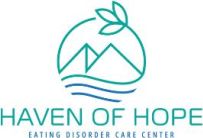





Haven of Hope Eating Disorder Care Center
Treatment Focus
You can get treatment for eating disorders at this center, helping you navigate symptoms, build coping tools, and restore your physical health under expert care.
Primary Level of Care
Offering intensive care with 24/7 monitoring, residential treatment is typically 30 days and can cover multiple levels of care. Length can range from 14 to 90 days typically.
Claimed
Recovery.com has connected directly with this treatment provider to validate the information in their profile.
Treatment Focus
You can get treatment for eating disorders at this center, helping you navigate symptoms, build coping tools, and restore your physical health under expert care.
Primary Level of Care
Offering intensive care with 24/7 monitoring, residential treatment is typically 30 days and can cover multiple levels of care. Length can range from 14 to 90 days typically.
Provider's Policy
Haven of Hope Eating Disorder Care Center works with several insurance providers. Please contact them for insurance verification and to discuss your options.
Haven of Hope Eating Disorder Care Center
Haven of Hope Eating Disorder Care Center
About Haven of Hope Eating Disorder Care Center
Haven of Hope is a specialized residential program in Memphis, TN, that supports women and female-identifying individuals aged 12 and older dealing with eating disorders and trauma. They offer a range of evidence-based, holistic treatments tailored to individual needs, addressing disorders like anorexia, bulimia, binge eating, ARFID, and diabulimia. Their treatment approach includes trauma-informed care, individual and group therapy, nutrition counseling, family therapy, yoga, and meal planning. This integrated approach aims to guide clients through their recovery journey in a compassionate and supportive environment.
Heal Deeply by Addressing Trauma's Roots
Haven of Hope places a strong emphasis on treating trauma, especially PTSD and attachment-related trauma, as part of their holistic approach to eating disorder recovery. Recognizing that many individuals with eating disorders have underlying trauma, they integrate trauma-informed care into their treatment plans to address both the eating disorder and the root causes of distress. Their approach helps clients process and heal from past trauma, understanding that unresolved trauma often influences harmful eating behaviors.
Explore a Typical Day
At Haven of Hope, a typical day is structured to provide comprehensive, individualized care, specific daily schedules may vary, the program generally includes:
Morning Check-In and Breakfast: Clients begin the day with a morning check-in, followed by a nutritious breakfast in a supportive group setting. Therapeutic Sessions: The day features a combination of individual therapy, group therapy, and specialized sessions such as trauma-informed yoga therapy and art therapy. These sessions aim to address the psychological and emotional aspects of eating disorders and trauma. Nutrition Education and Meal Planning: Clients participate in nutrition therapy and meal planning activities, guided by registered dietitians, to develop healthy eating habits and a positive relationship with food. Family Therapy: Involving family members in the recovery process is emphasized, with sessions designed to improve communication and support systems. Evening Reflection and Dinner: The day concludes with a group dinner and reflection period, allowing clients to process their experiences and progress.
Center Overview
Treatment Focus
You can get treatment for eating disorders at this center, helping you navigate symptoms, build coping tools, and restore your physical health under expert care.
Insurance Accepted
Cash Pay Rates
Estimated Cash Pay Rate
Center pricing can vary based on program and length of stay. Contact the center for more information. Recovery.com strives for price transparency so you can make an informed decision.
Levels of Care



Your Care Options
Specializations
Co-Occurring Disorders
A person with multiple mental health diagnoses, such as addiction and depression, has co-occurring disorders also called dual diagnosis.
Eating Disorders
An eating disorder is a long-term pattern of unhealthy behavior relating to food. Most people with eating disorders have a distorted self-image.
Post Traumatic Stress Disorder
PTSD is a long-term mental health issue caused by a disturbing event or events. Symptoms include anxiety, dissociation, flashbacks, and intrusive thoughts.
Trauma
Some traumatic events are so disturbing that they cause long-term mental health problems. Those ongoing issues can also be referred to as "trauma."
Who We Treat
Women only
Women attend treatment in a gender-specific facility, with treatment delivered in a safe, nourishing, and supportive environment for greater comfort.
Approaches
Evidence-Based
A combination of scientifically rooted therapies and treatments make up evidence-based care, defined by their measured and proven results.
Holistic
A non-medicinal, wellness-focused approach that aims to align the mind, body, and spirit for deep and lasting healing.
Individual Treatment
Individual care meets the needs of each patient, using personalized treatment to provide them the most relevant care and greatest chance of success.
Personalized Treatment
The specific needs, histories, and conditions of individual patients receive personalized, highly relevant care throughout their recovery journey.
Therapies
1-on-1 Counseling
Patient and therapist meet 1-on-1 to work through difficult emotions and behavioral challenges in a personal, private setting.
Meditation & Mindfulness
A practiced state of mind that brings patients to the present. It allows them to become fully aware of themselves, their feelings, and the present moment.
Animal Therapy
Animals can inspire trust and self-worth. In this experiential therapy, guided interactions are used to improve social skills and emotion regulation.
Aromatherapy
Inhaling or topically applying essential oils can help relieve stress, soothe pains, and relieve emotional distress.
Art Therapy
Visual art invites patients to examine the emotions within their work, focusing on the process of creativity and its gentle therapeutic power.
Canine Therapy
Friendly dogs provide a pleasant therapeutic experience, helping patients who've experienced trauma or separations build social and communication skills.
Equine Therapy
Guided interactions with trained horses, their handler, and a therapist can help patients improve their self-esteem, trust, empathy, and social skills.
Eye Movement Therapy (EMDR)
Lateral, guided eye movements help reduce the emotional reactions of retelling and reprocessing trauma, allowing intense feelings to dissipate.
Conditions We Treat
Personality Disorders
Personality disorders destabilize the way a person thinks, feels, and behaves. If untreated, they can undermine relationships and lead to severe distress.
Anxiety
Anxiety is a common mental health condition that can include excessive worry, panic attacks, physical tension, and increased blood pressure.
Bipolar
This mental health condition is characterized by extreme mood swings between depression, mania, and remission.
Depression
Symptoms of depression may include fatigue, a sense of numbness, and loss of interest in activities. This condition can range from mild to severe.
Eating Disorders
An eating disorder is a long-term pattern of unhealthy behavior relating to food. Most people with eating disorders have a distorted self-image.
Obsessive Compulsive Disorder (OCD)
OCD is characterized by intrusive and distressing thoughts that drive repetitive behaviors. This pattern disrupts daily life and relationships.
Post Traumatic Stress Disorder
PTSD is a long-term mental health issue caused by a disturbing event or events. Symptoms include anxiety, dissociation, flashbacks, and intrusive thoughts.
Trauma
Some traumatic events are so disturbing that they cause long-term mental health problems. Those ongoing issues can also be referred to as "trauma."
Languages
Care Designed for Your Needs
Personal Amenities
Amenities
Special Considerations
Center Pets
Addiction and mental health facilities with pets allow patients to interact with friendly dogs, cats, horses, and in some cases, even dolphins.
Activities
Yoga
Yoga is both a physical and spiritual practice. It includes a flow of movement, breathing techniques, and meditation.






